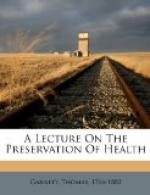must have some property different from dead matter,
which renders them capable of being acted upon by
these external powers, so as to produce the living
functions; for if they had not, the only effects which
these powers could produce, would be mechanical, or
chemical. Though we know not exactly in what
this property consists, or in what manner it is acted
on, yet we see, that when bodies are possessed of
it, they become capable of being acted upon by external
powers, and thus the living functions are produced;
we shall therefore call this property
excitability,
and in using this term it is necessary to mention,
that I mean only to express a fact, without the least
intention of pointing out the nature of that property
which distinguishes living from dead matter, and in
this we have the example of the great Newton, who
called the property which causes bodies in certain
situations to approach each other,
gravitation,
without in the least hinting at its nature; yet, though
he knew not what gravitation was, he investigated
the laws by which bodies were acted on by it, in the
same manner, though we are ignorant of excitability,
or the nature of that property which distinguishes
living from dead matter, we can investigate the laws
by which dead matter acts on living bodies through
this medium. We know not what magnetic attraction
is, and yet we can investigate its laws; the same
holds good with regard to electricity; if we ever should
attain a knowledge of the nature of this property,
it would make no alteration in the laws which we had
before discovered.
I shall now proceed to the investigation of the laws
by which the excitability is acted on; but I must
first define some terms which it will be necessary
to use, to avoid circumlocution, and at the same time
to give us more distinct ideas on the subject.
When the excitability is in such a state as to be
very susceptible of the action of external powers,
I shall call it abundant, or accumulated;
but when it is found not very capable of receiving
their action, I shall say, it is deficient,
or exhausted. I would not wish however,
to have it thought, that by these terms I mean in
the least to hint at the nature of excitability,
nor that it is really one while increased,
and at another diminished in quantity, for the abstract
question is in no shape considered; we know not whether
the excitability, or the vital principle, depends
on a particular arrangement of matter, or from whatever
cause it may originate; by the terms here used, I
mean only to say, that the excitability is easily
acted on when I call it abundant, or accumulated;
at other times the living body is with more difficulty
excited, and then I say, the vital principle is deficient,
or exhausted.
The laws by which external powers act on living bodies,
will, on a careful examination, be found to be the
following—
First, when the powerful action of the exciting powers
ceases for some time, the excitability accumulates,
or becomes more capable of receiving their action,
and is more powerfully affected by them.




